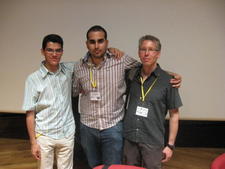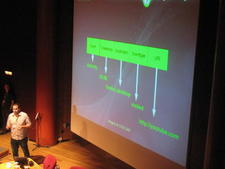Gran Canaria: GNOME Zeitgeist Tracks What You've Done
"Where are the notes I took online while at the library Tuesday night?" A question such as this might be best answered by the likes of GNOME Zeitgeist.
At the GNOME Users' And Developers' European Conference (GUADEC) track at the Gran Canaria Desktop Summit on July 5, Federico Mena-Quintero, Seif Lotfy and Thorsten Prante presented their Zeitgeist project. The team was working on a new way to make users' files searchable based on their daily usage events and patterns.
Zeitgeist consists of an engine that logs events and an activity journal that presents the logged events as a GUI. While the Zeitgeist engine is logging (per systrace) which applications are running and which files or URLs they're opening, the journal viewer can show a user which document he was viewing while email from his mother came in Monday of last week.
In this way the application can nudge your episodic memory to make event connections and organize your life. Zeitgeist's activity journal is the work of Seif Lotfy, currently a student at Darmstadt University. It shows user events based on date and time, and keeps track of the most commonly opened and collaborated upon files -- resulting in a semantic connection between the two.
Commonly occurring patterns can point to particular work activities. For example, opened source code together with an opened PDF and a bugtracker URL running in the browser can mean software development activity was going on. Thorsten Prante also indicated that Zeitgeist can pull external conditions into the equation. Next to time, GPS location can also be a consideration, so that a question such as "What file was I working on during the train ride from..." can be answered.
The Zeitgeist team clarified that their work isn't an index or desktop search such as Tracker or Beagle. Instead it simply tracks events and evaluates them. However, this doesn't mean that Zeitgeist events can't be combined with Tracker tags.
At the end of their presentation, the Zeitgeist team showed a particular application for their software: parental tracking. The software can close a child's browser or send a warning email to its parents based on detected usage events. While the use case provoked a mixed and even negative response from some, Seif Lotfy emphasized that it was only one of many possible Zeitgeist applications.
Subscribe to our Linux Newsletters
Find Linux and Open Source Jobs
Subscribe to our ADMIN Newsletters
Support Our Work
Linux Magazine content is made possible with support from readers like you. Please consider contributing when you’ve found an article to be beneficial.

News
-
Introducing matrixOS, an Immutable Gentoo-Based Linux Distro
It was only a matter of time before a developer decided one of the most challenging Linux distributions needed to be immutable.
-
Chaos Comes to KDE in KaOS
KaOS devs are making a major change to the distribution, and it all comes down to one system.
-
New Linux Botnet Discovered
The SSHStalker botnet uses IRC C2 to control systems via legacy Linux kernel exploits.
-
The Next Linux Kernel Turns 7.0
Linus Torvalds has announced that after Linux kernel 6.19, we'll finally reach the 7.0 iteration stage.
-
Linux From Scratch Drops SysVinit Support
LFS will no longer support SysVinit.
-
LibreOffice 26.2 Now Available
With new features, improvements, and bug fixes, LibreOffice 26.2 delivers a modern, polished office suite without compromise.
-
Linux Kernel Project Releases Project Continuity Document
What happens to Linux when there's no Linus? It's a question many of us have asked over the years, and it seems it's also on the minds of the Linux kernel project.
-
Mecha Systems Introduces Linux Handheld
Mecha Systems has revealed its Mecha Comet, a new handheld computer powered by – you guessed it – Linux.
-
MX Linux 25.1 Features Dual Init System ISO
The latest release of MX Linux caters to lovers of two different init systems and even offers instructions on how to transition.
-
Photoshop on Linux?
A developer has patched Wine so that it'll run specific versions of Photoshop that depend on Adobe Creative Cloud.


